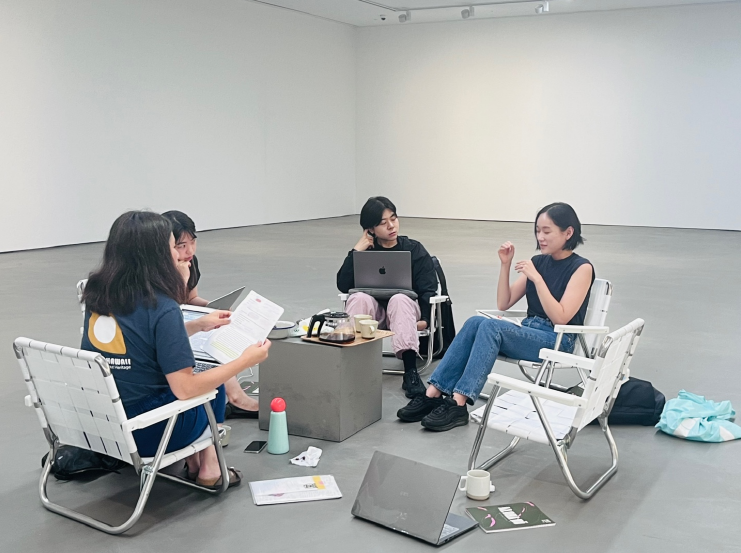Seminar Ⅲ - Binna Choi
Seminar Ⅲ - Binna Choi
For this workshop, we built on our previous conversation about the “curating agent” and on approaching “Casco Art Institute: Working for the Commons” and Hawaiian culture (centering on the concept of “aloha”) as a direct or indirect bridge between the concepts of “unlearning,” “de-instituting/reinstituting,” “commons,” “undercommons,” “island thinking,” “decolonization,” “indigenization,” “re-sacralization,” as well as “aloha” as a curatorial practice or role.
One curatorial idea from today’s gathering
- We established the notion of the commons as constructed of common assets and experience, oriented towards a collective imagination that is not nor
is able to be institutionally contained. We also explored new languages and lifestyles with the aim of establishing a circulatory framework. This was an
opportunity to ruminate on the definition-eluding word “aloha” and the undefinable characteristics of the curatorial practice that constitutes the
concept of the word. (Yurmyurng)
- Would it be possible for us to reexamine together existing beliefs and customs? We reflected on demographics that share prevalent standards,
examined the common notions and customs shared by those outside the main sphere, and thought about ways to create a new form of an
inclusive community. There’s a collective narrative inherent in Hawaiian vocabulary. Perhaps these words mediate the Hawaiian custom of
blurring the distinctions between the past, present, and future, as well as between oneself and others. (Jinju)
- “Mingling, connection, and other senses that tell us that we belong in the commons as a world larger than ourselves are fenced off to be replaced
by rationality, productivity, and efficiency” (What Is the Commons?: Beyond Capitalism and Reclaiming the Sovereignty of Life, Han Didi). The
discussion on the similarities between curating, housework, and mothering, and conversations around the necessity of approaching curating from
a feminist perspective was interesting. We considered curation as an act of dealing with complex and diverse subjects, which can be difficult to define
ithin the dominant, rationality- and efficiency-oriented systems of thought. Toward the end of the gathering, I was left with the question, “Could the
point of departure for unlearning the rationality-oriented system of thought that prioritizes maximum utility value be found in the Hawaiian language,
in which one word has multiple complex meanings?” (Jaemin)
Ideas/materials for the next gathering
- Rather than as an outcome itself, we may want to think about the exhibition as a creative process—what it is intended to achieve. My current interests
lie in examples of cases where cooking or lifestyle serve as an artistic medium: Food by Gordon Matta-Clark, Untitled by Rirkrit Tiravanija, Womanhouse
by Judy Chicago and Miriam Schapiro at Chicago at California State University, The Dinner Party by Judy Chicago, the Rice Brewing Sisters Club, to
name a few. (Yurmyurng)
- What are some of the adventures we’ve had as a curator? I hope to discuss the novel, raw, delightful, or tragic worlds we encountered in the process of
preparing for an exhibition; the people, relationships, and situations that left a lasting impact; the trivial moments that led us to identify ourselves as
curators; future encounters necessary for us to become the curators we want to be. My recent interest is in minorly regarded individuals who construct
a substantial worldview. (Jinju)
- We decided to each prepare a presentation for the next gathering, explaining our curatorial goal or course of direction. We aim to each bring several
keywords to the table—concept words, discourses, or common words that serve as our points of reference or emphasis. After listening to each person’s
presentations, it might also be intriguing to help one another identify new terms or draw connections among our own. (Jaemin)


